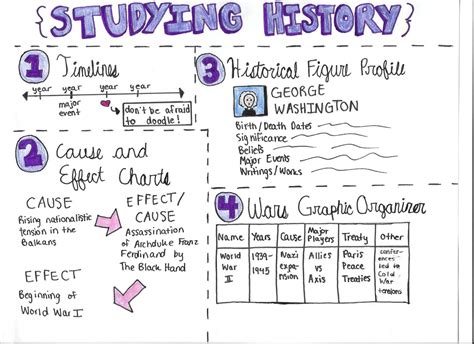Mastering history exams requires a strategic approach that harnesses effective study techniques and harnesses your understanding of the subject matter. This comprehensive guide will empower you with proven strategies to excel in your history exams and retain the knowledge long-term.

1. Establish a Foundation of Understanding
-
Review the Course Syllabus: Familiarize yourself with the specific topics, time periods, and sources covered on the exam.
-
Attend Lectures Regularly: Actively participate in class, take thorough notes, and ask questions to clarify any misunderstandings.
-
Read Assigned Materials: Engage with the textbooks, primary sources, and supplementary materials to gain a comprehensive understanding of the historical context.
2. Develop Active Study Habits
-
Spaced Repetition: Review the material multiple times over increasing intervals to strengthen your memory and recall.
-
Active Recall: Test your understanding by reciting information from memory without looking at your notes.
-
Elaboration: Connect new knowledge to existing concepts and personal experiences to enhance your understanding and retention.
3. Organize and Analyze Information
-
Create Study Maps: Visually represent the relationships between historical events, figures, and concepts using mind maps, timelines, or diagrams.
-
Identify Key Terms and Concepts: Understand the significance of specific terms and concepts by defining them and tracking their usage.
-
Analyze Historical Sources: Examine primary sources (e.g., letters, diaries, artifacts) and secondary sources (e.g., textbooks, articles) to develop a nuanced understanding of historical events.
4. Practice Exam Questions
-
Review Past Exam Papers: Study past exam papers to familiarize yourself with the structure, question types, and grading criteria.
-
Practice Answering Questions: Allocate time to answering practice questions to improve your time management and question-analysis skills.
-
Seek Feedback from Instructors: Discuss your practice answers with instructors or tutors to identify areas for improvement.
5. Review and Retention
-
Review Regularly: Dedicate time to reviewing the material covered throughout the course, even after you finish studying.
-
Use Flashcards: Create flashcards with key terms, concepts, and events to aid in memorization.
-
Engage in Discussions: Participate in study groups or online forums to discuss historical topics and reinforce your understanding.
Table 1: Active Study Techniques
| Technique | Description |
|---|---|
| Spaced Repetition | Reviewing material at increasing intervals |
| Active Recall | Reciting information from memory |
| Elaboration | Connecting new knowledge to existing concepts |
Table 2: Exam Preparation Strategies
| Strategy | Description |
|---|---|
| Creating Study Maps | Visualizing relationships between historical events |
| Identifying Key Terms | Understanding the significance of specific concepts |
| Analyzing Historical Sources | Examining primary and secondary sources for nuanced insights |
Table 3: Practice Exam Tips
| Tip | Description |
|---|---|
| Review Past Exam Papers | Familiarize yourself with exam structure |
| Practice Answering Questions | Improve time management and question-analysis skills |
| Seek Feedback from Instructors | Identify areas for improvement |
Table 4: Review and Retention Techniques
| Technique | Description |
|---|---|
| Regular Review | Dedicating time to reviewing material |
| Using Flashcards | Creating flashcards with key terms and concepts |
| Engaging in Discussions | Participating in study groups or online forums |
Conclusion
By implementing these effective study techniques and leveraging the guidance provided in this comprehensive guide, you can master your history exams and develop a deep understanding of the subject matter. Remember, consistent effort, active engagement, and a passion for history are essential ingredients for success.












